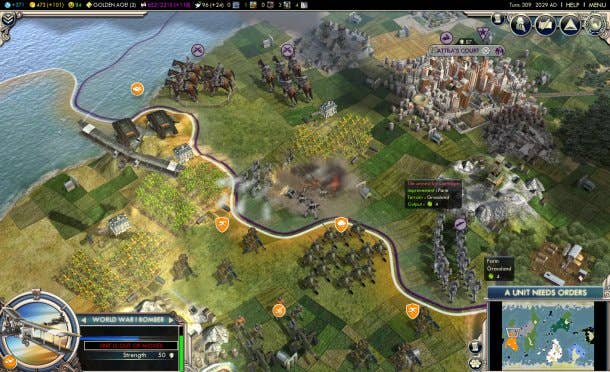The Sid Meier Advantage
The Civ designer talks about the advantage of being a veteran game maker and understanding gameplay as a psychological experience
Sid Meier has been making games for nearly three decades. The legendary game designer continues to evolve the strategy game genre with the Civilization V expansion pack, Gods & Kings. Meier's E3 was busy with two new Firaxis Games titles, the aforementioned Civ V expansion and the new XCOM: Enemy Unknown, a re-imagining of the classic 1993 turn-based strategy game.
Considered by many to be the "Father of Computer Gaming" from his MicroProse Software days, Meier remains entrenched in game development every day as director of creative development at Firaxis. The man behind hits like Railroad Tycoon, Sid Meier's Pirates! and Sid Meier's Gettysburg took a break to talk about the current game industry in this exclusive interview.
I always felt that there was a great opportunity for growth as we figured out how to make games better and we're seeing a larger audience today than ever before with social and mobile gaming and the gamification of everything. It's something that I actually thought would happen over time. We would start off with our core audience and strategy gaming, but as we figured out how to make games more accessible and reach a wider audience, it would grow.
The challenge with this kind of growth is to keep these new gamers interested in games and sustain this momentum. We need to keep them coming back to new games and fresh ideas. Time will tell whether this growth is one cycle in the industry or if it is something that is permanent.
"Older designers like me actually have an advantage over younger designers because we have worked hard to make people believe things despite the graphics"
Sid Meier
Having worked on older games that had crude graphics, older designers like me actually have an advantage over younger designers because we have worked hard to make people believe things despite the graphics. Part of the unholy alliance is that you need to create a suspension of disbelief. It's your part of the bargain, and it's the gamers' part, too.
I'm constantly surprised by the technology innovation that gets better and better, but on the other hand we always expect the industry to evolve and introduce new things. That's the part that keeps it fun and really interesting for us.

That's certainly a new opportunity to add to the App store, Xbox Live Arcade, PlayStation Network and all those places where the more reasonably sized games can find an outlet. If you can pull it off, then that's a great opportunity. I think we've certainly seen in the last couple of months some successes there. If you have something that is really compelling in terms of a story idea then that is a very interesting way to go.
I really enjoy making games, it's just fun. It's like taking a lumpy piece of clay and turning it into something very cool. Every day is part of that process. Not knowing exactly where we are going and figuring it out step by step is just a challenge. It's almost like the "one more turn" phenomenon in Civilization. It's looking to that next thing we are going to add to the game and seeing how we can just make it better. The fun for me is really not knowing from week to week what cool thing we are going to add and getting a chance to play with it and tweak it and the constant process of seeing a game grow before your eyes.
"The iPad is a beautiful piece of hardware that does really cool stuff. We're still trying to catch up in terms of game design and how to take advantage of it"
Sid Meier
I imagine we'll have different technologies to go through a cycle where they're brand new and you're experimenting with a lot of different ways of using this technology. That happened with the CD-Rom, with multiplayer on the Internet, and it's now happening in the early stages with social gaming and mobile gaming. In five years we'll have social gaming figured out with different genres. We'll have different kinds of social games and everyone will understand the rules and the interface. Mobile is probably a technology we haven't gotten the most out of.
Mobile games now are five minute quick gaming fixes. When you look at all the technology in a smartphone, the connectivity, the GPS, the camera, there are all sorts of things that could be integrated into a gaming experience that we haven't thought of yet. I have a feeling that we will start to explore more of what's possible in the whole space. Who knows what the technology will be. The iPad is a beautiful piece of hardware that does really cool stuff. We're still trying to catch up in terms of game design and how to take advantage of it.
"By acknowledging that simple concept-that gameplay is a psychological experience-it can make your games better"
Sid Meier
One of the key rules of game design is the first 15 minutes. These introductory minutes have to be fun, satisfying, and exciting. You are letting players know they're on the right track, you should reward them, and let them know cool stuff will happen later.
In early Civilization games, I made Civ real-time, which meant everything happened in real-time: My first mistake was to make it real time. I modeled some elements of the game from SimCity, which was real-time. It was inspiring. But what we found was that in real-time gaming the player becomes the observer. Our mantra is that, "it's good to be king." When we made Civ a turn-based game, the player became the star, they made things happen.
Gaming is a psychological experience. I base my games on things like railroads, pirates, and history, and I try to make the games I design true and real. The more historical, the more realistic, and the more factual, the better. During the early days of my career, I hadn't taken into account what was in the player's head. By acknowledging that simple concept-that gameplay is a psychological experience-it can make your games better.
I once gave a talk on how games should be split into four different difficulty levels. I was wrong. Now, Civilization V has nine difficulty levels. As players move on they continually get better and receive rewards. You want to feel they are above average. There is a basic dichotomy in games in that when you reward players for winning a war and give them 100 gold pieces, the player never really questions rewards. If something bad happens, if there is a setback to the player, they react much differently. They complain the game is broken.
If history is any guide, then PC will just continue to be a strong platform for gaming. We'll see a new generation or two of consoles. Maybe your watch might play a game, I don't know. I think gaming will continue to go wherever technology goes. It'll be a fun five years.

